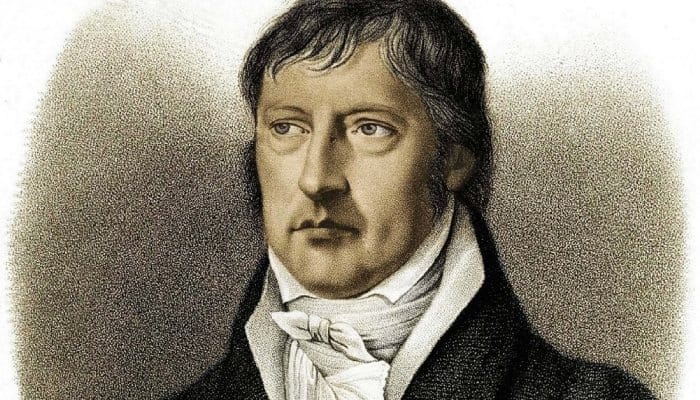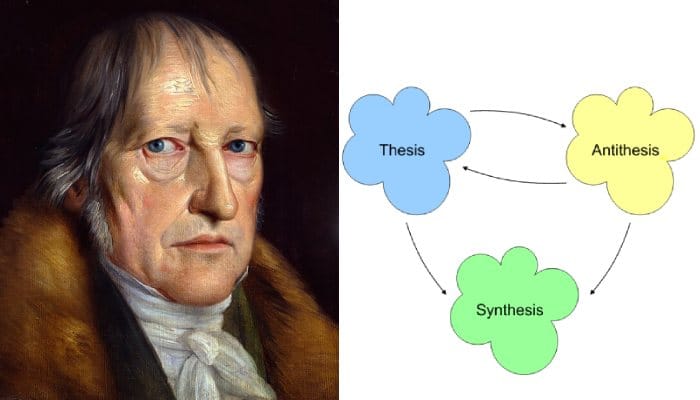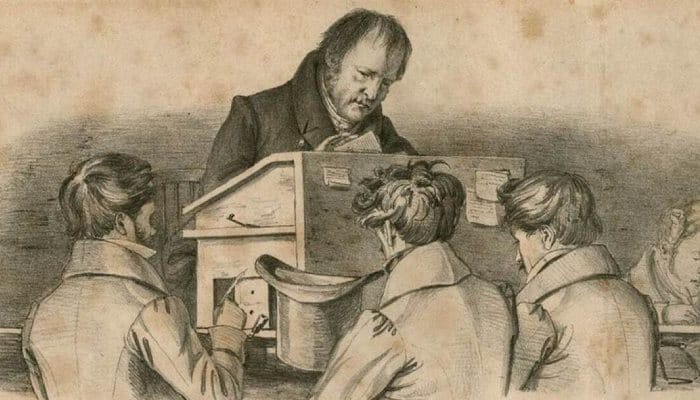
Blog
Hegel

Georg Wilhelm Friedrich Hegel (1770–1831) is considered one of the most influential philosophers in the history of Western philosophy. Through the development of a comprehensive and complex philosophical system that encompasses subjects such as logic, ontology, history, and ethics, he conducted a profound analysis of human and social realities. In his works, especially The Phenomenology of Spirit and The Science of Logic, Hegel proposed ideas that contribute to a deeper understanding of dialectical processes and the evolution of human history. His philosophy, grounded in the concept of dialectic, examines the interrelationships between thought and reality, asserting that reality is in a constant state of change and transformation. . In this text, we will attempt to explore various dimensions of Hegel’s philosophy.
فهرست عناوین
ToggleBiography of Georg Wilhelm Friedrich Hegel
Georg Wilhelm Friedrich Hegel, a prominent German philosopher, was born in 1770 in the city of Stuttgart. He is regarded as one of the most important representatives of the Romantic school and has had a profound impact on modern philosophy and thought. At the age of eighteen, Hegel began his studies in theology at the University of Tübingen, where he became acquainted with various ideas and theories.
In 1799, Hegel began collaborating with Friedrich Schelling at the University of Jena. This period coincided with the height of the Romantic movement in Germany, and Hegel gradually established himself as an independent and innovative thinker. After a period of teaching in Jena, he was appointed professor at the University of Heidelberg, which at the time was recognized as a central hub of German Romanticism.
In 1818, Hegel moved to the University of Berlin, which had become one of Europe’s major intellectual and academic centers. There, he continued teaching and promoting his philosophical system, leaving a significant impact on future generations of philosophers and thinkers. Hegel passed away in November 1831 due to illness, but by then, he had already attracted a large number of followers across various German universities and left a lasting influence on modern philosophy.

Dialectics: A Scientific Method for Understanding Phenomena
Dialectics, as a method of scientific inquiry, is employed across various fields such as political science, sociology, and philosophy. This method is based on specific principles that aid in the analysis and understanding of phenomena.
The two main pillars of dialectics are movement and contradiction. These two elements allow us to comprehend the internal changes and developments within phenomena. instance, Hegel states that if a leaf falls to the ground in one part of the world, it may have effects in other parts of the world. This statement highlights the interconnectedness and mutual dependence of phenomena.
Another important concept in dialectics is the notion of leap. This refers to sudden and major changes that can occur within a system or phenomenon, leading to fundamental transformations.
The term “dialectic” comes from the Greek word meaning “discussion” or “dialogue,” and its roots go back to ancient Greek philosophy. This concept is especially evident in the works of Socrates, Plato, and Heraclitus. Socrates, the great Greek philosopher, used the dialectical method in his search for truth. By asking simple and logical questions, he engaged in conversations with others, prompting them to think more deeply. This process involved recognizing the truth or falsehood of opinions, ultimately leading to the discovery of truth.
Plato, Socrates’ student, also utilized the dialectical method and incorporated it into his own theories. He regarded dialectics as a philosophical tool for attaining true knowledge and a deeper understanding of reality.
Heraclitus, a philosopher who lived around 500 BCE, pointed to the constant change in the world, famously stating, “Nothing is permanent.” This view contributed to the foundations of dialectical thinking, demonstrating that contradiction and change are inherent parts of nature and reality.
Suggested article: Xenon
Hegelian Dialectic: A Foundation for Understanding Transformation in Being
Georg Wilhelm Friedrich Hegel, the 19th-century German philosopher, introduced dialectics as a method for understanding transformation and change in reality. According to Hegel, this process is based on four fundamental principles that help explain how phenomena emerge and evolve.
روشی برای فهم تحول و تغییر در واقعیت
Hegel believed that all phenomena exist within the framework of time and, therefore, are transient and limited. No phenomenon can be considered an infinite or eternal reality. From this perspective, time acts as a fundamental factor in the formation and transformation of phenomena.
Second Principle: Contradiction and Complements in Being
In Hegelian dialectics, every phenomenon contains inherent contradictions. For example, the concept of night only gains meaning in relation to day. These contradictions are not only inseparable aspects of a phenomenon’s existence but also serve as the main driver for understanding and knowing them.
Third Principle: Change and the Emergence of the Opposite
Change occurs when a phenomenon becomes encompassed by its own essence or nature. At this point, the phenomenon transforms into its opposite, setting the stage for new transformations in being. This process highlights the constant interaction between different elements and their mutual influence.
Fourth Principle: Change as a Spiral Process
Hegel did not view change as a simple circular motion. He argued that change takes the form of a spiral or zigzag movement that progresses upward. This idea indicates that change over time is not linear but rather includes complex and diverse stages that do not lead to a single predetermined path.
Hegelian dialectics helps us gain a deeper understanding of the processes of transformation and becoming in reality. This approach is not only valuable in philosophy but also has widespread applications in the social and human sciences. It can serve as a powerful tool for analyzing complex issues.

Lessons from Hegel’s Philosophy
- The Importance of Learning from Opposing Views: One of the key points in Hegel’s philosophy is the importance of learning from opposing ideas. He believed that even from opinions we strongly disagree with, there are lessons to be learned. In other words, truth is not concentrated in one place; it may exist within the perspectives and experiences of those we consider wrong or even contemptible. Therefore, Hegel encourages us to approach others with openness and without prejudice, and to learn from them.
- Analyzing History and Truth: Ultimately, Hegel believed that in order to gain a deeper understanding of history and truth, we must engage in careful analysis of events and their underlying causes. He invites us to examine the complexities of history and use them to build a comprehensive picture of truth.
- The Challenges of Progress:Progress—especially in philosophical and social fields—is always accompanied by challenges and difficulties. Hegel maintained that progress is not possible without confronting hardships and obstacles. He emphasized that those unwilling to change their thinking and outlook will never truly grasp the nature of progress.
- Awareness and Action: Hegel argued that mere awareness of ideas does not guide a person toward growth and progress. For example, a person may know the harms of smoking, yet still continue to do it. Knowledge alone is not enough—action must follow.
- Institutions in Step with Social Change: Hegel believed that institutions are essential for achieving social stability. In other words, merely expressing correct ideas and beliefs is not enough; there must be practical means to implement them effectively.
He stressed that, in light of societal advancements, relying solely on new theories cannot lead to true progress. Rather, new institutions must emerge in tandem with social transformations.
Suggested article: Sigmund Freud
Hegel’s Phenomenology of Spirit
Phenomenology of Spirit, written by Georg Wilhelm Friedrich Hegel, is one of the most significant philosophical works, focusing on the history and development of human consciousness. In this work, Hegel emphasizes that each historical period must be studied within the specific context of its time and place. He believes that in order to understand history accurately, we must place ourselves within the temporal framework of that era and analyze it from that standpoint.
Hegel refers to the Middle Ages, describing it as a period of honor and nobility, while acknowledging the many injustices inflicted upon women and children during that time. He considers the role of historians to be crucial and asserts that they should identify and preserve the turning points of human well-being for future generations.
Hegel’s Thought on Art
Hegel believed that art has a profound and essential purpose. He emphasized that in order to develop a proper and meaningful perspective on the world, we need works of art. According to Hegel, art is the expression of ideas and emotions in a beautiful and emotional form.
In philosophy, ideas are typically conveyed through dry and logical reasoning. In contrast, art enables these ideas to be infused with emotion and feeling, making them more accessible and impactful.
In conclusion, Hegel calls upon individuals to recognize their historical position and to become aware of their inner self-governance and the social conditions in which they live. This kind of awareness, he believed, contributes to a peaceful and tension-free life.
برای مشاوره رایگان و رزرو وقت (یا اگر تماس گرفتید و قادر به پاسخگویی نبودیم) شماره تماس خود را وارد کنید. ما به زودی با شما تماس می گیریم!



